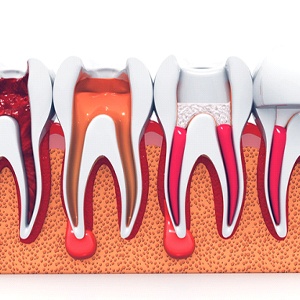
Has this ever happened to you? You meet someone whose reputation precedes them and then you discover that they’re nothing like their reputation at all. Well, that pretty much sums up what happens when one of Dr. Jorgenson’s patients receives root canal therapy, or endodontic treatment. Most people think that it’s going to be painful. However, a root canal in Costa Mesa is intended to alleviate the pain of an infected tooth, not cause it! Read on to learn more about root canal therapy and why it’s an important treatment.

To understand root canal treatment, we first need to understand the structure of a tooth. The outer protective layer of each tooth is called enamel. The mid-layer is called dentin, which is much more sensitive. Finally, at the core of every tooth there is the pulp chamber which contains lymph and nerve tissue as well as blood vessels. Each chamber breaks off into canals that lead to the tip of the root. These canals allow your teeth to absorb nutrients from your bloodstream and eliminate toxins.
Normally, the layer of dentin and pulp are safely protected by the enamel that surrounds your tooth. However, if that surrounding layer is breached by severe tooth decay, traumatic injuries, or a deep crack, then bacteria can enter the pulp chamber and cause infection. Other than a serious toothache, the signs of infection include:
When you come to Advanced Dental Care for a root canal, Dr. Jorgenson will first make sure you are completely comfortable in the exam chair. If you need a bit of help calming your nerves before the procedure, then just mention that when you schedule your appointment. Dr. Jorgenson can prescribe oral conscious sedation to help you relax. Once the area surrounding the tooth is sufficiently anesthetized, we will access your tooth’s chamber and remove any infected tissue or debris. The canals are treated with a disinfecting solution and filled with a biocompatible material called gutta-percha. More than likely, Dr. Jorgenson will want to prep the tooth for a crown that will further protect it.
Root canals get a bad reputation, but the fact is that we use them to get patients out of pain rather than put them in it. We will always ensure that our patients are numb and comfortable before beginning. And, as mentioned above, we offer sedation options for patients who want a deeper sense of calmness. After your root canal, you may feel some sensitivity and pain, but this can be managed with our post-treatment instructions.
It is completely normal to feel some sensitivity after your root canal, especially to hot or cold temperatures. Try chewing on the other side of your mouth for the first few days, and you can also take over-the-counter pain medication to make yourself feel more comfortable. If your sensitivity hasn’t dissipated after a few days, call our office right away! Dr. Jorgenson will carefully examine your tooth to see if there is still a possible infection.

The cost of root canal therapy depends on a few factors. During your consultation, our team can discuss the financial aspect of your care and help you understand your payment options. Although a root canal may cost more than other treatment options, such as an extraction, it can actually help you save money in the long run by preserving your oral health!

Some factors that may have a bearing on the cost of your root canal include:

Yes, the initial cost of a tooth extraction is generally less than that of root canal therapy. However, we encourage you to consider, not just the upfront expense, but also the long-term value of each option.
With a tooth extraction, you must pay for tooth replacement afterward. Otherwise, you put yourself at risk of issues like a misaligned bite, an unsightly gap in your smile, and even additional tooth loss. A dental implant can cost thousands of dollars.
Root canal therapy preserves your natural tooth and can spare you from having to pay for tooth replacement or the oral health issues that accompany missing teeth. Really, it may be cheaper in the long run than getting the tooth pulled!

Very often, yes, dental insurance does cover root canal therapy. It is usually classified as a major procedure, so up to 50% of its cost may be covered, up to the amount of your plan’s annual maximum. With the help of your insurance, you might be able to save hundreds of dollars out of pocket! Our team welcomes insurance, and we are in-network with several popular plans. We will do our best to help you maximize your benefits.

Outside of insurance, other provisions that could help you afford root canal therapy include:
Are you interested in learning more about the cost of root canal therapy? Our Costa Mesa team is ready to answer your questions, so do not hesitate to reach out to us. We look forward to speaking with you!

If you have a badly damaged or infected tooth, root canal therapy can save it from extraction; however, the treatment has a bad reputation, so it’s normal to have a few concerns. You have nothing to fear. Much of what you may have heard isn’t true or has been greatly exaggerated. We will take the time to explain the procedure and address any concerns during your initial consultation. While you wait for your appointment, here are the answers to a few common questions to help ease your anxieties.
You’ve probably heard horror stories about the pain experienced during a root canal, so you might be surprised to learn the procedure typically isn’t any worse than a traditional dental filling. The endodontic procedure has undergone several improvements to minimize any discomfort. In addition, we’ll use an anesthetic to numb the area to keep you as comfortable as possible during the treatment. It’s normal for your tooth to be a bit tender for a few days while you recover, but you can manage it using an over-the-counter pain reliever.
It’s not uncommon for your tooth to hurt initially, and then the pain subsides after a few days. You might think the infection has resolved on its own, but this isn’t necessarily the case. Your tooth can still be infected on the inside. If it isn’t treated, the infection can spread to surrounding teeth and even into the bone.
If we recommend a root canal, it’s best to have the treatment performed right away. If you wait too long, you might lose your tooth or suffer irreversible damage to your smile.
Extracting a problematic tooth may eliminate the issue at the source, but it opens the door to a new list of complications associated with missing teeth. Every tooth is essential to a healthy, functional smile. Losing even a single tooth increases your risk of cavities, gum disease, and additional missing teeth. Not to mention, your self-esteem and quality of life can suffer if you don’t invest in a dental prosthetic. You could avoid the complications of missing teeth by rehabilitating your tooth with root canal therapy.
A dental crown is a custom-made cap placed over the entire visible surface of a tooth down to the gum line. They are made of all-ceramic material to match the appearance of your natural teeth. A crown is often needed after a root canal to protect the tooth from additional damage while also restoring its appearance and function.
There isn’t a set fee for root canals because the cost is determined by your specific treatment plan. Although every policy differs, many dental insurances will cover a portion of the cost after reaching your annual deductible. We’ll work on your behalf with your insurance company to maximize your benefits to lower the amount you need to pay out-of-pocket.
I Need a Checkup & Cleaning I am Looking for a Dentist for My Child I am Concerned About Bleeding Gums I Have a Cavity or Broken Tooth I am Missing One or More Teeth I am Unhappy with My Smile I Want a Straighter Smile I am Scared of the Dentist I am In Pain & Need Help I Need My Wisdom Teeth Removed View Our Services